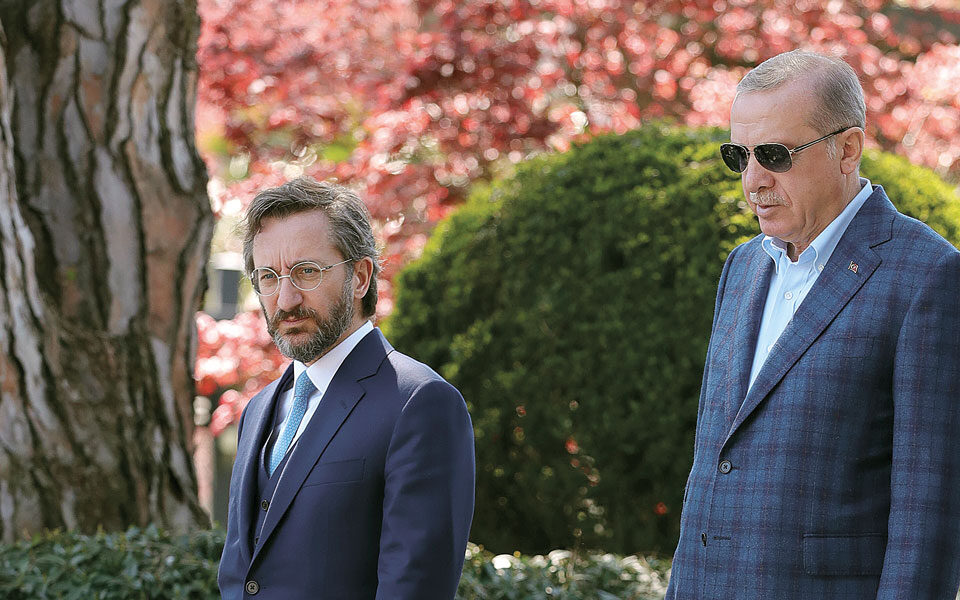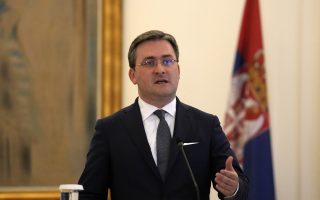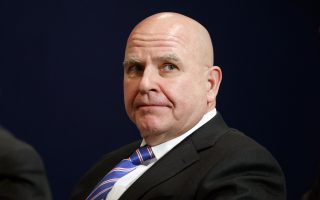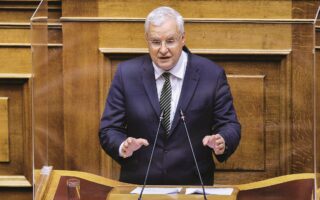‘Turkey responds to Greece’s provocations’
Erdogan adviser tells Kathimerini Ankara is irked at Greek PM for trying to get third parties involved in bilateral ties

We met the director of communications for the Turkish presidency, Fahrettin Altun, at his home in Istanbul. He welcomed us warmly as we sat down to a long discussion that covered all the key issues in Greek-Turkish relations, as well as Ankara’s plans for the future, but also domestic developments. All of our questions met with a calm answer, even when we expressed Greece’s positions on hot button issues.
Altun is regarded as one of Turkish President Recep Tayyip Erdogan’s closest aides. He is by his side at every meeting and every communication with foreign leaders. Some even think of Altun as one of the most important people in Erdogan’s closest circle of advisers.
This Kathimerini interview is the Greek media’s first with a Turkish official since the spike in tensions in April, the increase in Turkish violations of Greek airspace, Kyriakos Mitsotakis’ visit to the United States and Erdogan’s subsequent decision to sever all communications with the Greek prime minister.
The messages and opinions conveyed by Altun may offer some insight into how Ankara views these recent developments and how it plans to proceed in the immediate future.
Could you comment on President Erdogan’s decision to cut all communications with Greek Prime Minister Mitsotakis? Why did he decide not to meet with him, saying that Mitsotakis “no longer exists” to him? Wouldn’t it be useful to reduce the tensions, improve relations and have dialogue and communication between Ankara and Athens?
We want a good relationship with all of our neighbors and for peace and stability to prevail in the region. However, we will not allow anyone to take advantage of our good intentions, so that things don’t go south. Our president had already opened the channels of dialogue, giving the Mitsotakis government a chance. The Greek prime minister did not seize the opportunity. And even though he promised not to get third parties involved in the bilateral relationship, he sent messages against Turkey in the United States. That ended what credit he had with Ankara.
I would also like to stress that even though Turkey is constantly in the Greek media, Greece does not feature so heavily in the Turkish media. Greece is only harming itself by antagonizing Turkey with petty calculations or by turning to third countries. Likewise, the resolution of our differences within the framework of diplomacy and international law are foremost in the interest of the Greek people.
Do you believe there could be a new meeting between Erdogan and Mitsotakis sometime soon, if the necessary conditions were created?
I do not think that there can be such a meeting under the current circumstances. Mitsotakis squandered the opportunity he was given by Turkey. As a result, he indulged circles that feed off tension. Greece’s resources will not be spent on education and culture, but on defense procurements. And we have come to this entirely as a result of the Mitsotakis government’s choices. The Greek prime minister will have to make a significant effort in order to convince Turkey that it is sincere in acting like a civilized neighbor.
Certain representatives in the US Congress claim that Turkey plans to annex northern Cyprus, to make it Turkish territory. Republican Turkish Party (CTP) lawmaker Ongun Talat has even spoken of an annexation effort that has not been announced yet. These are developments that are being widely covered by the Greek and Greek-Cypriot media. Does the Turkish government indeed have such a plan?
‘If Turkey wanted to play a game as dangerous as Greece, you would have seen Turkish military jets in the skies of Attica’
Those who are annoyed by the strengthening of the relationship between Turkey and the Turkish Republic of Northern Cyprus are constantly making new claims. Their aim is to divide the Turkish-Cypriot community and to drive a wedge between the Turkish Cypriots and Turkey.
As you are aware, Turkey recognizes the Turkish Republic of Northern Cyprus as a sovereign state and is in favor of a two-state solution for Cyprus. The main reason is that the Greek Cypriots are opposed to a solution, despite all the well-intentioned steps that have been taken, and because we have absolutely no tangible indication that the crimes committed against the Turkish Cypriots in the previous century will not be repeated.
Greece will only hurt itself by opening a discussion on existing international treaties. It would wrong to interpret this warning as a threat by Turkey to Greece.
The international community, which has not taken a clear stand towards the inhumane and illegal embargoes imposed by the Greek-Cypriot administration [the Republic of Cyprus] on the Turkish-Cypriot people and even ignores the enshrined right of the Turkish-Cypriot people, has no right to have any say in relations between Turkey and the TRNC whenever it suits it.
No one – no matter what they say – has the power to undermine the exceptional ties between the Turkish Cypriots – who are an integral part of the Turkish nation – and Turkey.
Is there any information regarding where the Abdulhamit Han drillship will be conducting seismic surveys? Could it provoke a fresh spike in tensions?
As you know, Turkey has made serious inroads in the energy sector recently. We ended our dependence on other countries in this matter by purchasing our own drillships. We started with the underwater pipelines for transporting the natural gas we found in the Black Sea from the sea to land. All of this was possible thanks to our president’s determination and vision. Where our drillships operate is determined only by the decisions taken by Turkey, as a sovereign nation. Under international law, no one can be annoyed by the activities carried out by Turkey with its own drillships.
Turkey claims that Greece has violated the status of the islands and says that if it does not stop these “violations,” Ankara will initiate a “discussion on the islands’ sovereignty.” There has also been a letter to the United Nations on the subject. Is that still the position? The Greek side says this stance is a threat to its territorial integrity.
As you are aware, according to the 1923 Lausanne Treaty and the 1947 Paris Peace Treaties, certain islands were granted demilitarized status. For years we have watched Greece violate international agreements by militarizing these islands. Turkey also warns that Greece will only harm itself by opening up the existing treaties to discussion. It would be wrong to take this warning as a threat by Turkey against Greece. Likewise, anyone who thinks that Turkey will not speak out against these illegal steps by Greece on this issue clearly does not understand Turkey.
Why did the Greek prime minister’s speech to the US Congress and his visit to the United States provoke such a reaction from Ankara?
The issue here is not that the Greek prime minister went to the United States, or any other country for that matter, but that despite the promises he made to Turkey, he is trying to involve third parties in our bilateral relations. He may believe that Greece has benefited from such maneuvers in the past. However, it needs to be understood that Turkey is no longer the old Turkey.
According to a recent report in Kathimerini, Turkish military aircraft flew over Greek islands 120 times in the first four months of 2022 and violated Greek airspace 2,377 times. That is a major increase compared to 2021. Can you comment on this matter?
First of all, I must say that I find it odd that a newspaper like Kathimerini has not asked the Greek authorities about the violations of Turkish airspace by Greek aircraft. It is Greece that has been escalating the tension in the Aegean for some months now. Let me give you a specific example: Greek aircraft flew over continental Turkey on April 27, violating our airspace in the areas of Datca, Didim and Dalaman. These are not claims being made by us; these are specific examples with radar imagery we share with allied countries. Turkey responds to Greece’s provocations. Allow me to explain the incident of April 27 so that your readers can visualize it. If Turkey wanted to play a game as dangerous as Greece, you would have seen Turkish military jets in the skies of Attica. But we have no such intention. We were not and are not the side that is increasing the tension. That said, we have the means and capabilities to respond to every move.
F-16 program, elections and FETO
The US House of Representatives has approved a draft bill seeking to restrict the sale of F-16 fighter jets and upgrade kits to Turkey. It includes conditions that relate to Greece. What is your view on this matter? Do you think that Turkey will be able to purchase the jets?
The process is ongoing and technical meetings have been held in Ankara over the past few months between our military authorities and their American counterparts on the request to purchase and upgrade F-16s, and the necessary progress has been achieved at this stage of the process. The United States government also has a positive attitude towards our request at the political level. The letter in response sent by the US State Department to certain members of Congress who oppose our demand was actually very enlightening on the subject. Likewise, President [Joe] Biden showed clear support for the issue with the statements he made at the last NATO Summit [in Madrid]. In this framework, and as the authorities in the US have pointed out, our demand is also significant in terms of NATO’s deterrence and defense capabilities, as well for the Alliance’s interoperability. We therefore believe that the administration will take the necessary actions so that our request is approved by Congress and the process can be completed as quickly as possible.
Are snap polls at all likely in Turkey? President Erdogan has announced his candidacy. What is your assessment of the six-party coalition and who do you think will be put forward by the opposition?
‘Our demand is significant in terms of NATO’s deterrence and defense capabilities, as well for the Alliance’s interoperability’
Our president has answered this question personally on many occasions and has stated very clearly that the elections will take place, as planned, in 2023. When Turkey is compared today with the state it was in when our honorable president took over 20 years ago it is obvious. Recep Tayyip Erdogan is a leader who has faced multiple coup attempts, from domestic and foreign centers of power, as well as efforts to steer policy. You can be certain that the Turkish people are very aware of what it means to have real leaders in these times of worldwide chaos.
What changed in Turkey after the attempted military coup of July 15, 2016? The prevailing sense in the Western media is that rule in Turkey is becoming more authoritarian. What do you think? Also, can you comment on the fact that your fight against FETO was part of the agreement at the NATO Summit in June so that Ankara would lift its veto of Sweden and Finland’s accession to the Alliance?
Turkey made significant inroads, particularly in the area of national security, after the treasonous attempt to overthrow the government on July 15. By infiltrating strategic state institutions, members of FETO had sabotaged many crucial activities, and especially with regard to the crackdown on terrorism. After the attempted coup, identifying those members of the organizations and weeding them out from every sector, and especially the public administration, became a matter of national security. Describing this effort as authoritarian cannot be interpreted in any other way than that the people making such claims have an interest in those people remaining in those positions.
We asked Sweden and Finland to take specific steps, not just vis-a-vis FETO, but also the PKK and the Syrian branch of the YPG. In the end, our interlocutors agreed to what were reasonable demands and this was recorded in the trilateral memorandum.
The fact that cracking down on FETO is included in such a document is, of course, a reflection of Turkey’s diplomatic success. So, based on this, we approved the invitation to those two countries at the summit in Madrid. Now, Sweden and Finland’s induction to NATO depends on whether they meet the conditions outlined in the tripartite memorandum.





